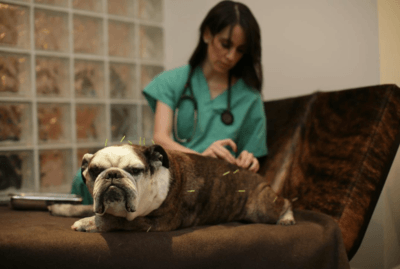Veterinarian Dr. Rachel Barrack was skeptical at first but she eventually got the point (pun intended). Veterinary Acupuncture can be a boon to an animal suffering from pain and other medical issues. The ancient Chinese practice, in fact, already has gained growing acceptance for treating dogs, cats and horses. Now it is being applied to help a wide range of animals including, elephants, cattle, monkeys and rabbits. But what exactly is animal acupuncture and how does it work? Dr. Barrack, who is certified in veterinary acupuncture & Chinese herbology, recently spoke with WellWell to point out the benefits (sorry, couldn’t help ourselves).
What is animal acupuncture?
Acupuncture is a healing art that has been used in Chinese veterinary practice for thousands of years to treat a variety of medical conditions. It is considered the mainstay of traditional Chinese medicine. When used on animals, acupuncture can provide pain relief, stimulate the immune and nervous systems, increase microcirculation, and decrease inflammation. Acupuncture can also help restore the balance between organ systems for optimal health and overall well-being.
How does animal acupuncture work?
Acupuncture is performed by inserting thin, sterile, stainless steel needles into specific points on the body. Most acupuncture points are located along 14 major channels, which form a network that carries blood and energy throughout an animal’s entire body. The process produces a physiological response that deals with pain, immune systems, etc.
What is the biggest misconception about animal acupuncture?
One of the biggest misconceptions about acupuncture is that it hurts. In almost all cases, it is relatively painless. Some animals may experience minor discomfort when needles are being inserted but the needles are so thin that most patients tolerate them very well. Acupuncture is known to have a relaxing effect to the point that some animals even fall asleep during treatment.
What are the benefits of holistic medicine for animals?
As a veterinarian, I am always committed to offering my patients the best possible care in order to provide them with the highest quality of life at all times. Therefore, I am always exploring different methods to achieve this goal.
Two specific patients sparked my interest in Chinese medicine. Many years ago, while working full time at Belmont Park and Aqueduct Racetrack, I was faced with a particularly challenging case. This particular horse had a very unusual lameness that would not resolve with extended rest and extensive western treatment. I had heard that acupuncture could be of help, so although skeptical, I figured why not give it a shot. I reached out to another colleague who was a certified veterinary acupuncturist and, shortly after being treated, my patient was able to make a full recovery and eventually returned to racing. I was amazed!
What was the second patient?
Not long after that, I was treating a cat suffering from advanced cancer. Although this cat was receiving palliative western therapy, his owner was looking for something else to make him more comfortable. I watched as another colleague utilized acupuncture and Chinese herbal therapy to help better the remainder of this cat’s life.
This led you to start focusing on animal acupuncture?
I was so intrigued that I began studying under Dr. Xie of the Chi Institute in Gainesville, FL. Once I began incorporating acupuncture into my veterinary repertoire, I was astounded at the amazing benefit I was now offering my patients. My practice of medicine was forever changed. Today, I offer an integrative approach to veterinary medicine which allows me to offer the best of both eastern and western therapies to the animals in my care and to provide the most optimal care.
What are some specific conditions you’ve treated using animal acupuncture?
I’ve had so many wonderful patients benefit greatly from acupuncture and Chinese herbology. My most rewarding patients are those whose lives are vastly improved—those suffering from chronic conditions such as debilitating arthritis or severe allergies or those who are able to undergo chemotherapy more comfortably due to the supportive care of Chinese medicine.
Additionally, I have successfully treated dogs who are paralyzed with intervertebral Disk Disease (IVDD). This is a serious condition in which the cushioning discs in between the vertebrae bulge or herniate into the spinal cord space. This causes nerve compression resulting in pain, nerve damage, and even paralysis. It is so rewarding to see a dog unable to walk at all make a complete recovery following treatment.
About Dr. Rachel Barrack
Dr. Rachel Barrack is a licensed veterinarian with additional certifications in both veterinary acupuncture and Chinese herbology. She provides on-site, integrative treatment to animals– ranging from smaller pets, like dogs and cats, to larger equine athletes and show horses. Dr. Barrack’s aim is to assess the best treatment plan for your pet and then administer acupuncture and Chinese herbology as needed. To learn more visit instagram.com/animalacupuncture or facebook.com/animalacupuncture










